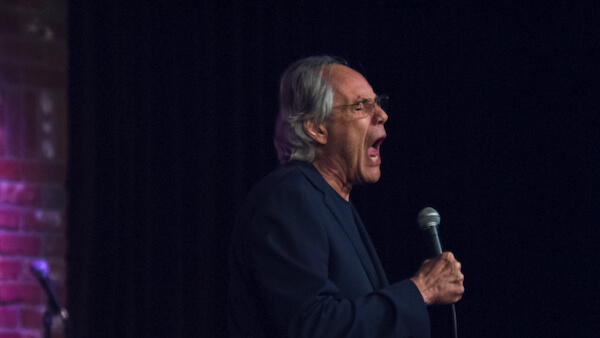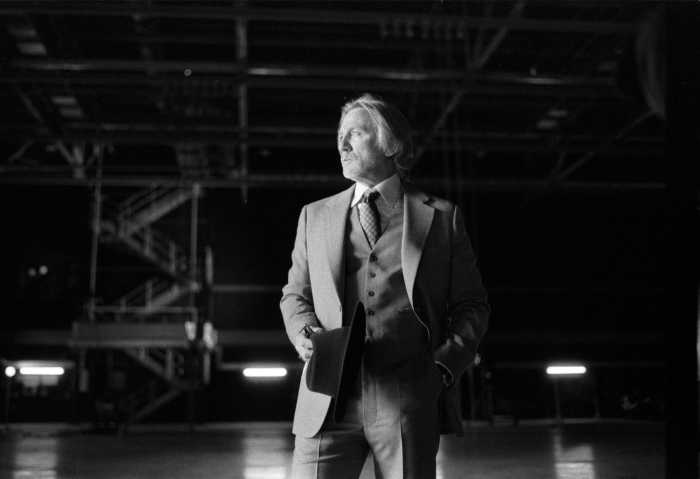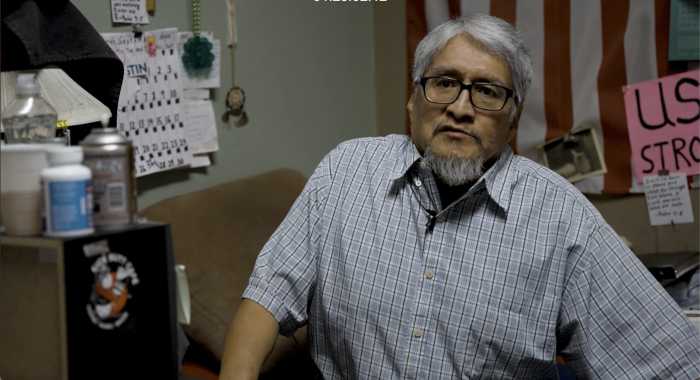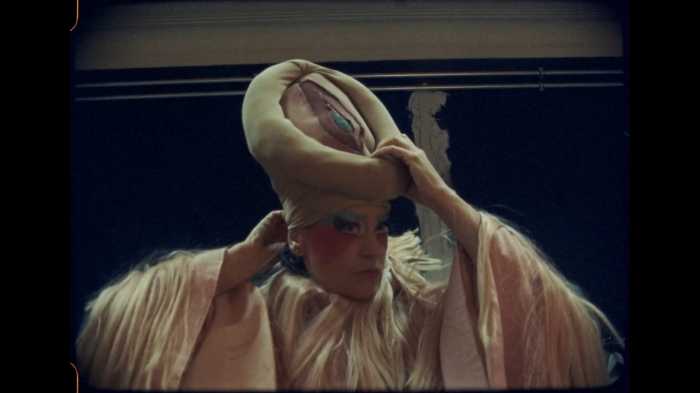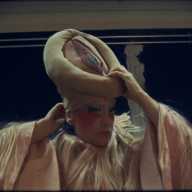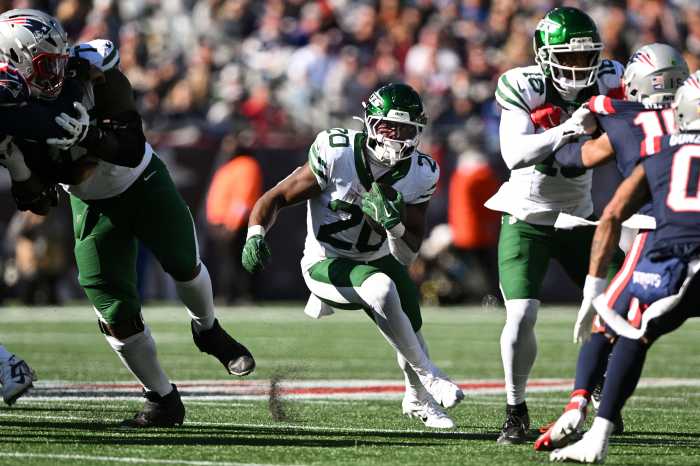The veteran comedian in “Robert Klein Still Can’t Stop His Leg.” | COURTESY: FALCO INK.
You won’t see a funnier film this year than “Robert Klein Still Can’t Stop His Leg,” the hilarious and heartwarming documentary about the veteran comedian. One of the very few who I can always, always count on to make me laugh, he also proved a dream of an interview, totally forthcoming and utterly delightful.
“I enjoy this film, myself,” he told me. “My director, Marshall Fine, had written a profile about me and was also the head of the New York Film Critics Association for a long time, a very quiet, laid back Jewish guy from Minneapolis. My basic input was the material. When Marshall got all these people [Jerry Seinfeld, Billy Crystal, Bill Maher, Jon Stewart, Jay Leno among them] to say these things about me, I said, ‘The material has got to be the best.’ We put in most of what we wanted to, except for a couple of really good bits where I talk about my father being upset when I was watching Little Richard in the 1950s: ‘What is this “Tutti Frutti” a code word for you kids?!’ It baffled him. And later on when my kid was 11, listening to the Red Hot Chili Peppers — ‘What I’ve got you’ve got to give it to your mamma’ — it created the same parental anxiety. We couldn’t use it because the damn Chili Peppers wanted $15,000 to use four bars of their song. I actually used it in one of my HBO specials, but we had a much more limited budget on this film.
“I told Marshall from the start that it can’t be some ultra-serious bio. There was my lousy divorce — the only negative and sad thing about it. It was disgusting for two years — the ulcers and wasted money — but I wanted the movie to be funny. Marshall finally put together a sizzle reel of about four and a half minutes. He was at some film festival — Dubai, I think — and Harvey Weinstein said, ‘Let’s do it,’ and it’s wound up at Starz. I’m happy it landed where it did and we’re getting good feedback.”
IN THE NOH: New doc celebrates Robert Klein’s rich life and career
I told Klein that, watching him, George Carlin, and David Steinberg on TV as a kid, it seemed to me that they were the only really hip comedians around, the others’ presentation and material were so much more conservative in a countercultural time.
“Johnny Carson, who was so generous — sometimes only he and the band knew what I was talking about — sent me a note through the producers saying he wanted me to wear a coat and tie. But then he relented. There was a certain stereotypical look comedians had, with the cufflinks and tuxedos.
“But there were some good ones among them, too. I was pleased to work with Don Rickles, who is not an intellectual comic by any means. His body is failing, but his mind! [Just days after this interview, Rickles died.] Marshall goes up to him and says, ‘Mr. Rickles, I’m doing a documentary on Robert Klein,’ and he said, ‘Are you that much in need of money?’
“I did a thing with Jonathan Winters and the same thing. He was in such bad shape, and he died about a year later. I was honored to speak at his memorial, was so honored. His mind to the end was as sharp as a tack. And for me that’s a template for old comedians. I occasionally go to the Friars Club and for years Henny Youngman would hold court at lunch, but then he started to lose his acuity at the lunch table. He’d be babbling or forget what he was talking about. He still knew all his jokes, but then they started to fade. So, when I start foaming at the mouth and babbling that I’m Abraham Lincoln, then it’s time to hang it up.”
A memorable early film role for Klein was “The Owl and the Pussycat” in 1970: “That was the happiest set. We shot in it in New York. We’d take long lunches, Streisand, [George] Segal, and me, at Nathan’s, which had a big restaurant on 43rd Street. Nobody seemed to be in a rush. She’s purported to be difficult, but not with me. I worked with her in Vegas for three weeks and the movie. She was always a doll with me.
“Here’s a little trivia, David. This pretty blonde who was supposed to be my date with no lines turned out to be Marilyn Chambers, the porn star. Her name was Marilyn Briggs, poor thing died in the early 2000s; most of them do, pimped out. She was a very young woman and had the face of an angel. She was actually the face on the Ivory Soap box. We were in bed a lot, during the shooting — there was no hanky panky and we were not nude. But she said, ‘Oh, my father’s going to kill me when he sees this. He’s very strict.’ Wah-wah… I didn’t even know until six years later when Buck Henry pointed it out to me.
“I‘ve been in over 40 films and get a handsome pension from SAG. It’s tedious to repeat things over and over, but then it’s there. I’ve done about six Broadway shows, which I wouldn’t want to do anymore: you have to show up eight times a week. For a live audience, I get satisfaction from doing stand-up. I did a show Sunday night and on Saturday in Rhode Island and maybe do 45 standard comedy shows a year. I get all the feedback and the energy. I think a lot of these movie and TV stars want to do Broadway to show they can do it and sign short contracts. Jeremy Piven was terrific in that play [‘Speed-the-Plow’ in 2008] but then claimed to be poisoned by sushi. What he was was going crazy by repeating the same lines every night.”
Nurtured in show business by Rollins and Joffe Management, Woody Allen’s team, Klein remains a New York chauvinist.
“I became an honorary Angeleno because I was in both earthquakes, 1971 and 1994, while working there. I’ve spent an awful lot of time there and twice I rented places out there to do a series and they didn’t work out. But at this stage in my life, I don’t want to sign away seven years of my life and relocate.
“I love living here, here in Westchester County, the Lower Hudson River Valley. I also have a little place in the city, which I love, born and raised there. I love stepping out into the fresh air with a beautiful view of the Hudson, so I get a bit of both.
“Personally, I’ve been alone for 28 years. I was married once to an opera singer, Brenda Boozer, a very pretty girl who sang at the Met for nine years. I’ve had a few relationships since then. But I enjoy my life. My bucket list is not to climb Mount Everest but to get up in the morning, read the Times, and have a good bowel movement. And you’re breathing. I want very simple things, David.”
His long career has brought Klein in contact with the most extraordinary people, like Barbara Harris, who has always fascinated me, on Broadway in “The Apple Tree.”
“Oh I was so in love with her! She was at Second City four years before me and had been married to Paul Sills, its original director. Then they were breaking up yet still working together. She had a thing with Alan Alda, and there was no animosity between Paul and Alan.
“She was very fragile, and that was my first Broadway show, directed by Mike Nichols. She was so vulnerable. I took her up to the Botanical Gardens in the Bronx and we talked. It was like a kid brother thing, with her saying, ‘Oh, Warren Beatty won’t leave me alone!’
“And then the Tony Awards happened, on a Sunday night when we were dark, at the Shubert Theater. She was going to perform a scene from our show, and she was like ‘I can’t go on!’ And Alan Alda tried to calm her down, while Larry Blyden, her co-star, was furious, saying, ‘There are millions of people waiting to see you!’ Anyway, she won the Tony and the very next day, during the first act, I’m in my dressing room upstairs and the squawk box is on — you hear the performance day after day and get used to it. But there were these silences that shouldn’t be there, and we all ran downstairs to see what was the matter.
“Barbara was suddenly babbling to the audience, completely in another world. Finally, Jerry Adler who was Hesh on ‘The Sopranos,’ but then the biggest stage manager on Broadway, rings down the curtain in the middle of the first act. A call went out to Phyllis Newman at the Beresford, who was Barbara’s understudy, because her voice couldn’t take eight shows a week. Carmen Álvarez, the second understudy, suited up and finished the first act. She did the second act, and Phyllis did the third.
“Barbara was out about two months, and it more or less finished her. I hear she lives in Phoenix. If you listen to the original cast album of ‘On a Clear Day,’ she may not have had Streisand’s virtuoso voice, but her interpretation is beautiful. She was an incredible talent, improvising at Second City, but a victim of what I guess you call mental illness. I wrote about this in my book, ‘The Amorous Busboy of Decatur Avenue.’ That incident was heartbreaking to see, with Alan Alda not knowing what to do. And he always seemed to be the kind of guy who knows exactly what to do, Alan. Hopefully, she’s found some peace.”

